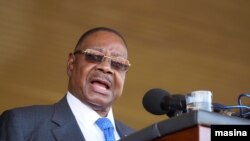Malawi's president has proposed new safety measures against the coronavirus, which has infected 36 people in Malawi and caused three deaths. The president is offering cash payments to the poor to help them survive a proposed lockdown, and to persuade vendors to close shops. But vendors, who protested plans for the lockdown two weeks ago, say the payments would be too small.
In a televised national address, President Peter Mutharika said the government will make cash payments to support Malawians who normally depend on the markets for their livelihood.
He said the government will target a minimum of 172,000 households, representing an estimated 35 percent of the urban population.
“Each identified household will be paid electronically through mobile payments, K35, 000 per month and the amount is based on the prevailing government minimum wage rate,” said Mutharika.
The payments are equivalent to about $50 per month, and would last for six months.
The proposal is in response to demands from vendors and rights activists who two weeks ago protested the government’s proposed 21-day lockdown.
The lockdown never went into effect following the street protests and an injunction by the nation’s High Court.
Chancy Widoni is the chairperson at Ndirande Market in Blantyre. He told VOA by telephone that the proposed payments are too small.
He says, we cannot expect the government to give each one of us what we earn per day. But, he adds, the amount announced is too small to sustain us for 21 days. It would have been better if they increased to payments to K50,000. We can be sourcing the additional amount on our own.
Betchani Tchereni, a lecturer in economics at the University of Malawi, says expanded testing would be a better solution to the crisis the country is facing.
He spoke to VOA by telephone.
“In fact, the universal testing can be the best, that everyone should be tested," said Tchereni. "Where people have been tested and have been found to be positive with a virus, then they should be quarantined somewhere. Because if we do a universal testing, then a lot of people will be quarantined, we may not even need a lockdown.”
The president said registration for the payments would begin next month. There has been no word on when the payments would start, and whether markets in the major cities may close down.





